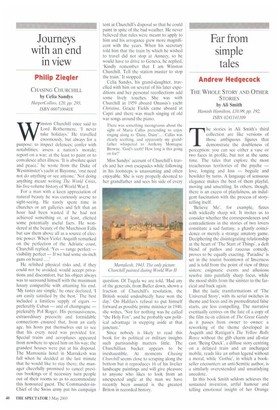Journeys with an end in view
Philip Ziegler
CHASING CHURCHILL
by Celia Sandys HarperCollins, £20, pp. 293, ISBN 000710040X
Winston Churchill once said to Lord Rothermere, 'I never take holidays.' He travelled enormously, but always for a purpose: to inspect defences; confer with notabilities; assess a nation's morale; report on a war; at the least to paint or to convalesce after illness. 'It is absolute quiet and peace,' he wrote from the Duke of Westminster's yacht at Bayonne, 'one need not do anything or see anyone.' Not doing anything meant writing The World Crisis, his five-volume history of World War I.
For a man with a keen appreciation of natural beauty he was curiously averse to sight-seeing. He rarely spent time in churches or art galleries and felt that an hour had been wasted if he had not achieved something or, at least, elicited some potentially useful facts. He wondered at the beauty of the Murchison Falls but saw them above all as a source of electric power. When Violet Asquith remarked on the perfection of the Adriatic coast, Churchill replied, 'Yes — range perfect — visibility perfect — If we had some six-inch guns on board ....'
He relished physical risks and, if they could not be avoided, would accept privations and discomfort, but his object always was to surround himself with the maximum luxury compatible with attaining his end. 'My tastes are simple,' he once declared, 'I am easily satisfied by the best.' The best included a limitless supply of cigars — preferably Cuban — and of champagne — preferably Pol Roger. His persuasiveness, extraordinary precocity and formidable connections ensured that, from an early age, his hosts put themselves out to see that his every need was provided for. Special trains and aeroplanes appeared from nowhere to speed him on his way; the grandest houses were put at his disposal. The Mamounia hotel in Marrakesh was full when he decided at the last minute that he would like to stay there; the manager cheerfully promised to cancel previous bookings or if necessary turn people Out of their rooms so as to accommodate this honoured guest. The Commander-inChief of the Swiss army put his campaign tent at Churchill's disposal so that he could paint in spite of the bad weather. He never believed that rules were meant to apply to him and his arrogance grew more magnificent with the years. When his secretary told him that the train by which he wished to travel did not stop at Annecy, so he would have to drive to Geneva, he replied, 'Kindly remember that 1 ant Winston Churchill. Tell the station master to stop the train.' It stopped.
Celia Sandys, his grand-daughter, travelled with him on several of his later expeditions and her personal recollections add some lively touches. She was with Churchill in 1959 aboard Onassis's yacht Christina. Gracie Fields came aboard at Capri and there was much singing of old war songs around the piano.
There was something incongruous about the sight of Maria Callas pretending to enjoy singing, along to 'Daisy, Daisy'.... Callas was clearly seething, and apparently my grandfather whispered to Anthony Montague Browne. 'God's teeth! How long is this going on for?'
Miss Sandys' account of Churchill's travels and her own escapades while following in his footsteps is unassuming and often enjoyable. She is very properly devoted to her grandfather and sees his side of every
question. Of Tugela we are told, -Had any of the generals, from Buller down, shown a fraction of Churchill's resolution, the British would undoubtedly have won the day.' On Halifax's refusal to put himself forward as possible prime minister in 1940, she writes, 'Not for nothing was he called "the Holy Fox", and he probably saw political advantage in stepping aside at that juncture.'
Since nobody is likely to read this book for its political or military insights such partisanship matters little. The Churchillian bucket appears to be inexhaustible. At moments Chasing Churchill seems close to scraping along the bottom but it reproduces 16 of his livelier landscape paintings and will give pleasure to anyone who likes to look from an unexpected angle at the man we have recently been assured is the greatest Briton in recorded history.










































































 Previous page
Previous page